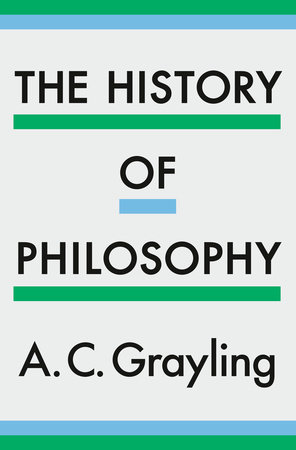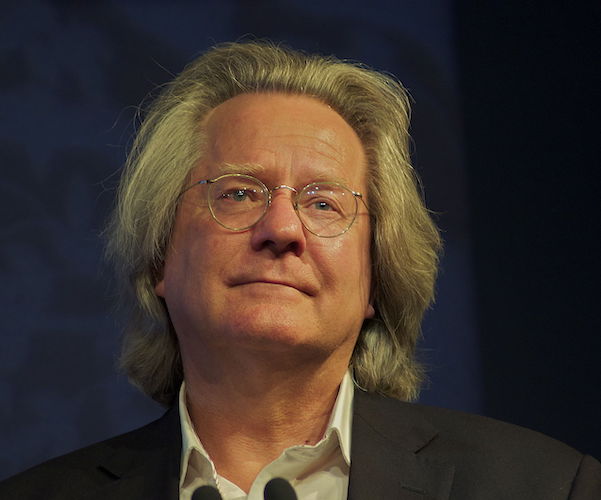Book Review: “A History of Philosophy” — An Excellent Tour for the Curious
By Thomas Filbin
A.C. Grayling’s history is an excellent tour for the curious and a refresher for everyone who had Philosophy 101 and wants to remember why it was so moving at the time.
The History of Philosophy by A.C. Grayling. Penguin Press, 682pp. $35.
 I went to hear Willard Van Orman Quine speak in Cambridge several years before he died in 2000 at age 92. Perhaps the most distinguished American philosopher of the 20th century and a longtime Harvard professor, his main fields of inquiry were logic and the philosophy of language. That, if nothing else, would encourage one to focus on the essential and disregard the superfluous. At question time someone stood to pose a long-winded query that was plainly not to solicit information, but for the questioner to be able to say, “As Quine and I once discussed…” Quine grew impatient with the rambling disquisition, and when the man finally finished and asked if Quine would agree, the great man looked at him and gave a witheringly monosyllabic “NO,” then moved on to someone else. The job of a philosopher is not for the faint of heart; people expect wisdom when all you can give them is some brief moment of disillusion.
I went to hear Willard Van Orman Quine speak in Cambridge several years before he died in 2000 at age 92. Perhaps the most distinguished American philosopher of the 20th century and a longtime Harvard professor, his main fields of inquiry were logic and the philosophy of language. That, if nothing else, would encourage one to focus on the essential and disregard the superfluous. At question time someone stood to pose a long-winded query that was plainly not to solicit information, but for the questioner to be able to say, “As Quine and I once discussed…” Quine grew impatient with the rambling disquisition, and when the man finally finished and asked if Quine would agree, the great man looked at him and gave a witheringly monosyllabic “NO,” then moved on to someone else. The job of a philosopher is not for the faint of heart; people expect wisdom when all you can give them is some brief moment of disillusion.
Unlike disciplines such as chemistry or sociology, whose practitioners could readily state a definition of what they study, philosophy’s problems begin with what to call itself. “The search for wisdom,” “the quest for the meaning of life,” or “the proper understanding of how language works when it tries to describe reality,” would all be working definitions for different philosophers.
A.C. Grayling, a distinguished British academic, has written a first-rate guide to the wisdom of the ages, starting with the Greeks, who invented rational inquiry, spurning myth in favor of attempting to figure out matters by observation, cause and effect, and logic rather than implicating the gods. The Pre-Socratics such as Thales, Anaximander, Anaximenes, and Pythagoras got things rolling, and although their attempts did not get everything right, it was a huge step up from inquiring of Apollo what it all meant. They speculated on the planets, the tides, and storms, always seeking to find natural causation for things. Pythagoras’s mathematical theorems are valid today, and supposedly the inscription over his school’s door was “All is number.” Parmenides speculated on change, being and becoming, while Zeno and his paradoxes considered time and space. Grayling observes that this period of philosophy was marked by trying to formulate “a systematic, inclusive theory that brought all phenomena together into a single explanatory framework constrained by…observable facts.”
The golden age of Socrates, Plato, and Aristotle took thinking beyond natural philosophy to consider matters such as ethics, politics, and social theory. Much of what educated people talked about for centuries was based on their work.
The middle ages and early modern era are well covered by Grayling. Much of medieval thought was concerned with what we call “natural theology,” and was dominated by figures such as Anselm, Thomas Aquinas, Duns Scotus, and William of Ockham. One notable feature of this period was the rediscovery of classical authors. Latin and Greek were studied again and the wisdom of the ancients was incorporated into Christian thought. Aquinas synthesized Aristotle into a system that was eventually pronounced by the pope as the true philosophy of the church.
The modern period found rationalism superseding faith, and eventually the influence of the new science brought philosophy into maturity as empiricism. Descartes, Hobbes, Locke, and Hume are all given detailed treatment in this book. Hume especially holds a place of honor for Grayling, who feels Hume’s empiricism was really the beginning of modern analytical philosophy. For Hume there was no logical basis for assuming the sun must rise tomorrow because it has risen every other day. We have only observed occurrences, not a natural law. Hume’s famous dictum about volumes written on metaphysics and religion is repeated: “Does it contain any abstract reasoning concerning quantity or number? Does it contain any experimental reasoning concerning matter of fact and existence? No. Commit it then to the flames, for it can contain nothing but sophistry and illusion.”
Empiricism is experimental rather than dogmatic, and we are all empiricists now, save for a few snake-handling mystics in the southern Appalachians who claim biblical protection from serpents because of the power of their faith. Reaching out to the world for answers has become the norm rather than reaching inside the mind. We trust what experience teaches us more than what theories tell us we should believe. Grayling notes also that “Hume was adamant that philosophy—here in the generalized sense of enquiry and reflection—belonged to the world at large, and not to the academy or the scholar’s study alone.”
The very modern period of the 20th century is where Grayling shines. The analytic philosophers of the British/American/German tradition like Frege, Russell, Wittgenstein, Ayer, and Quine were absorbed by logic and how little we know about our own language and how it bewitches us. The job of philosophy became to clarify propositions, not to tell us whether God exists or if there is life after death. This quest was both more modest and more ambitious in forgoing much of what was the history of philosophy by examining more closely things we had wrongly assumed.

A.C, Grayling. Photo: Wiki Common.
Perhaps the most underread philosopher today is Gilbert Ryle, a lifelong Oxford don. As an undergraduate, his book The Concept of Mind was urged upon me, but I was too young and ill-formed to understand it (perhaps because I was still grappling with my own metaphysical questions on God and the meaning of life). The notion of “mind” as opposed to “body” has troubled philosophers for centuries. Can there be both a material and immaterial component of ourselves? How would we define and differentiate them, and does believing in immaterial entities mark one as an unscientific thinker?
“Category mistake” was Ryle’s term for when we think something is one thing but really is another. He felt the mind-body problem was a false dichotomy, expressed that way for so long that we could hardly think differently about it. But in examining what exactly is “the mind,” Ryle made an analogy using the term “university.” If a visitor asked to see Oxford University, we could take him on a tour of all the colleges, visit the Bodleian Library, see the science laboratories and museums, athletic fields, and the chapels, but if at the end he asked “All very nice, but where is the university?,” it would be because he assumed “the university” was somehow a thing separate and apart from all the constituent entities he had seen. In the same fashion, “mind” is not a thing, but a concept embracing all of our mental functions involving our brain and central nervous system. For me this was an “aha” moment, and Grayling credits the book as Ryle’s master work.
Grayling’s history is an excellent tour for the curious and a refresher for everyone who had Philosophy 101 and wants to remember why it was so moving at the time. Well written and detailed without being dense and fragmented, it takes care to also include non-Western thought from India, China, Africa, and the Arabic-Persian traditions
Thinking of Quine again, his definition of philosophy was best: the name we have for all the questions we don’t have answers to; when we do, we call it science.
Philosophy today might seem the most impractical or even disposable subject in the curriculum. Young people studying at universities now seem obsessed with STEM subjects: understandable, but neglecting “why” to understand “what” is a bad bargain.
Thomas Filbin’s book reviews have appeared in The New York Times, The Boston Globe, and The Hudson Review.
